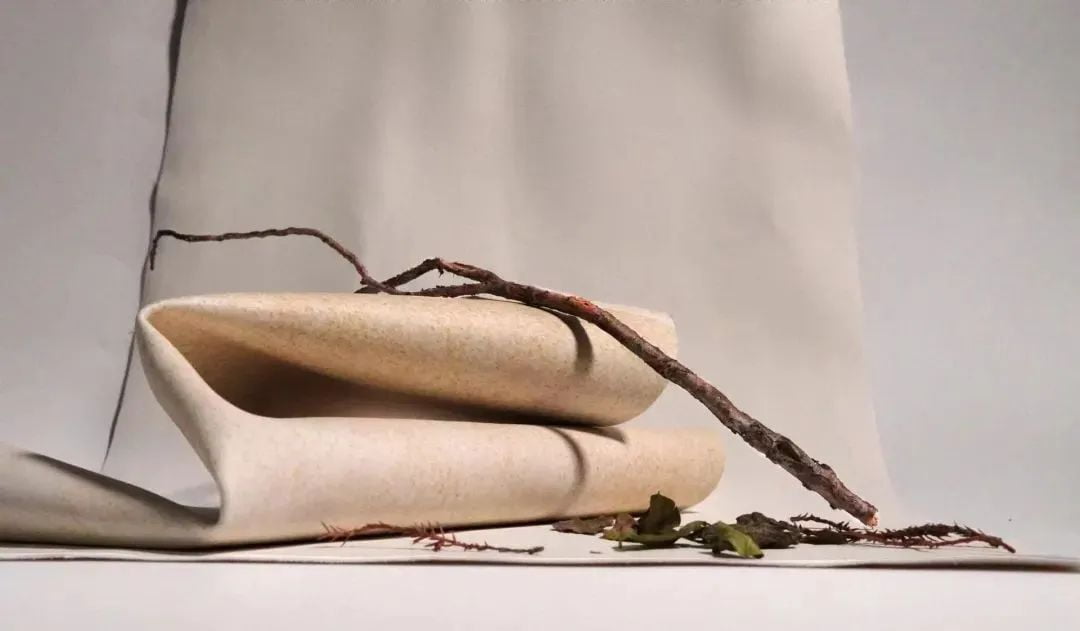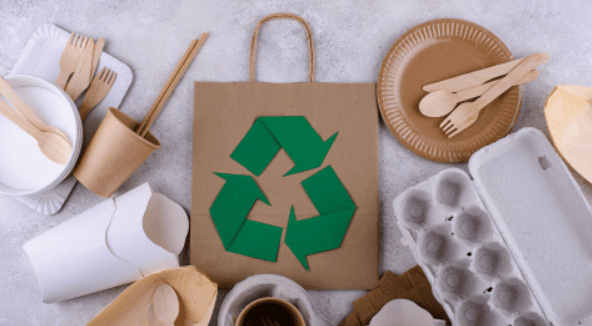Based on the increasing maturity of the cross-fertilization and application of bio-based material technologies, bio-based products have been widely welcomed for their sustainability and environmentally friendly properties. These products not only bring innovation to various industries, but also play an important role in promoting sustainable development and reducing environmental impact.
Fashion
Mycelium Leather by Bolt Threads
Bolt Threads is a U.S.-based biotechnology company specializing in the research and production of new biomaterials.

In 2018, Bolt Threads debuted its innovative Mycelium Leather, a revolutionary product that immediately attracted the attention of a number of big-name brands, including Stella McCartney and Adidas. sadly, however, the company discontinued the product last year.
Travel Bags by Mycoworks
Mycoworks is an American biotechnology company specializing in the design and production of sustainable handbags. Most recently, it collaborated with Hermès to launch the "Victoria" travel bag, which is made from sustainable raw materials.
Hermès is a French luxury brand known for its high-quality leather goods and accessories. In recent years, Hermès has also committed to sustainability and has partnered with other biotech companies to launch a line of products made with sustainable ingredients.
Now, Mycoworks has joined forces with Hermès and combined Ecovative's technology to launch the new Forager™ leather brand.
Modern Meadow's collection of Bio-Tex™ materials
Modern Meadow is a biotechnology company based in New York City, USA, focused on developing technologies to manufacture leather and meat using biotechnology.
Modern Meadow has innovated a unique method of manufacturing leather substitutes: by producing engineered animal proteins in yeast. Working closely with Limonta, an Italian textile and materials supplier, this company is committed to producing the Bio-Tex™ material range in a more responsible way. This material significantly reduces greenhouse gas emissions and lowers the environmental impact of the production process.
Modern Meadow's patented BioVERA™ biomaterial has a similar texture and feel to traditional leather, suede or chamois materials, making it ideal for the fashion and leather goods industries. Notably, the Tory Burch Ella Tote handbag made with Bio-Alloy™ technology is now available for sale, an achievement that demonstrates the commercialization of Modern Meadow's technology.
Construction sector
Solugen's concrete
Solugen of Houston specializes in carbon-negative chemicals that make concrete more environmentally friendly through enzyme chemistry and renewable raw materials. The company's Relox concrete admixture is not only biodegradable and non-toxic, it also reduces the amount of cement and water used in concrete.
Biomason's bio-based cement
Biomason, on the other hand, has developed Biolith®, a commercially available bio-based cement, with support from the U.S. Department of Defense. And Prometheus Materials, a company incubated at the University of Colorado at Boulder, draws inspiration from coral and oyster shell-building processes, combining microalgae and other natural ingredients to produce zero-carbon bio-based cements and bioconcrete.
Bacterial material from Basilisk and material from algae from Pneuma Bio.
Basilisk is working to create "self-healing concrete" that can repair cracks in building materials by embedding special limestone-producing bacteria in the concrete. Another startup, Pneuma Bio, plans to create biomaterials containing photosynthesizing algae.
Packaging
Ecovative's Cannabis and Mycelium Packaging Materials
Ecovative is a materials science company headquartered in Green Island, New York (USA), founded in 2007.
Packaging consumes a significant portion of resources over the life cycle of a product. And in the current field of new technology development, the core challenge for the packaging industry is how to achieve sustainability while remaining cost-effective.
To address this challenge, Ecovative has created compostable packaging material using hemp and mycelium. This innovative packaging is already available in North America through distributor Mushroom Packaging, while in Europe and the UK it is distributed by Magical Mushroom Company.

Material from Bioplaster's algae
Bioplaster is a German company focused on the development of biodegradable plastic products based on biotechnology.
Although mycelial packaging offers a creative solution, there is still a need to directly replace existing packaging materials in a variety of application scenarios. To this end, the Mexican company Bioplaster is dedicated to the development of algae-based materials in a variety of areas such as water-soluble plastic films, thermoplastic granules, biodegradable yarns, and biofoam.
Films of Mango Materials and Ourobio PHA
Mango Materials is a California-based tech startup founded by three women working on biodegradable bioplastics, and OuroBio is a Chinese biotech company focused on microbiome research and applications.
Mango Materials is working to produce films based on PHA (polyhydroxy fatty acid esters), which are biodegradable in a wide range of environments.
Ourobio, on the other hand, offers further possibilities in the field of sustainable packaging by converting by-products from the dairy industry into PHA packaging materials through biofermentation technology.
Negative Carbon Materials Field
Sportswear capsules with LanzaTech technology
LanzaTech, a New Zealand-based biotechnology company, is a leader in the field of carbon-negative materials, utilizing an innovative technology that converts greenhouse gases from various industrial by-products into valuable biomaterials.
In 2023, global fashion giant H&M launched a capsule collection of sportswear using recycled carbon polyester fibers derived from the very technology of LanzaTech.
LanzaTech has also partnered with adventure travel brand Craghoppers to launch a sustainable wool collection called CO2Renu. Made from a blend of 30% recycled carbon-derived PET and 70% recycled plastic bottle PET, the collection demonstrates its innovative strength in sustainable materials.
Cemvita's protein and plastic materials
Cemvita Factory is a U.S.-based startup focused on decarbonization using synthetic biology. eCO2™ technology developed by Cemvita is capable of producing valuable materials such as proteins and plastics from various waste streams and carbon dioxide.
Pneuma Biosciences' Photosynthetic Microalgae Enables CO2 Sequestration
Pneuma Biosciences is a U.S.-based biotechnology company focused on developing innovative respiratory therapeutic products. The company utilizes its proprietary respiratory fluid platform technology to develop innovative medicines for the treatment of various respiratory diseases.
Pneuma Bio has come up with an innovative idea to sequester carbon dioxide by cultivating photosynthetic microalgae with carbon capture capability inside the material.
Consumer goods sector
Geno's bio-based BDO
Geno has been a pioneer in successfully scaling up the production of 1,4-butanediol (BDO), a breakthrough that brings tremendous business value to the consumer goods industry.BDO, a key bulk chemical, is widely used in the manufacture of a wide range of plastics, from everyday shoes to high-end electronics. The commercialization of bio-based BDO not only offers cost advantages, but more critically, it can directly replace traditional fossil feedstocks and significantly reduce carbon emissions by up to 90%.
DIY Polyurethane Pollinator™ Casting Kit for Microalgae from Checkerspot
Checkerspot is a biotechnology company based in the U.S. that specializes in the production of specialty oils through the fermentation of microalgae.Checkerspot is also a leader in biotechnology for consumer products. Its flagship product, the WNDR Alpine ski, uses microalgae as a raw material that not only ensures the sustainability of the material, but also outperforms traditional materials in terms of performance. In addition, Checkerspot has introduced bio-based technology to the mass consumer sector by launching a DIY polyurethane Pollinator™ casting kit, allowing more consumers to experience the unique appeal of bio-based products.
Other
The field of synthetic biology is being revolutionized with the rapid development of new technologies such as artificial intelligence (AI) and nanomanufacturing. These technological advances have opened up entirely new possibilities for bio-based materials. Nanomanufacturing techniques have increased the precision of materials fabrication, and 3D printing (including ultrasonic 3D printing) has expanded the range of design architectures. Genetic engineering techniques enable scientists to introduce unnatural amino acids into peptide chains, while AI-assisted protein design helps scientists encode new functional genes into protein materials. Not only can these technologies be used individually, but they can also be cross-fertilized to create entirely new materials that exhibit greater biological precision and functionality with ease of fabrication.
In addition, several synthetic biology companies such as SolenaMaterials and Cambrium are using AI-designed materials to break traditional limitations. These materials not only improve sustainability, but also create entirely new possibilities for familiar proteins by introducing new functionality. This is not only mimicking existing properties (e.g., replacing animal leather), but is a revolutionary innovation that goes beyond traditional technologies.

